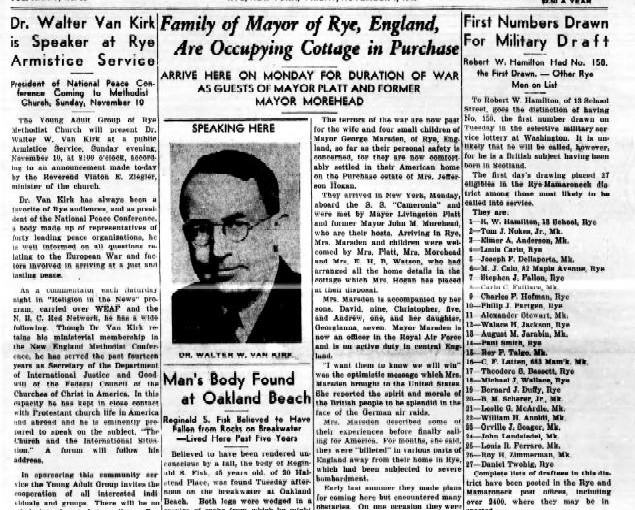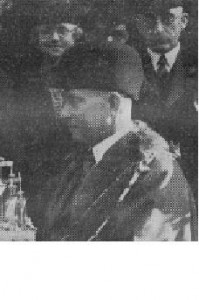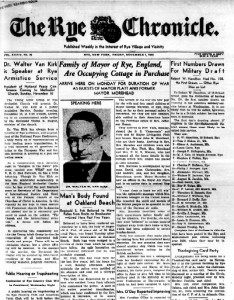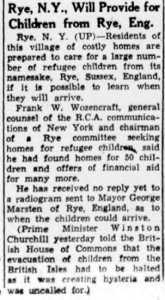By The Editor
Four years ago I was intrigued by Arthur Woodgate’s recollection of the 1937-40 Mayor of Rye, George Marsden. The mystery surrounding where he came from and where he went in 1940 have haunted me since Arthur first told me about George Marsden’s Mayoralty so I decided I must delve deeper.
Frank Palmer, who knows an awful lot about former Rye Mayors was unable to help, or any of the many old Ryers I talked to. They all seemed to have Arthur’s idea of ‘mystery man’ passed down as part of local folk law.
Jo Kirkham, one of only two surviving members of the old Rye Borough Council, has some childhood memories of George Marsden and has seen paperwork that gives a clue to some collusion between him and the Mayor of Rye New York which might have some bearing on what happened to him.
There are two parts to the George Marsden mystery.
One – Who was George Marsden and where did he come from?
And Two – Where did he go in 1940?
The first part was not difficult. He described himself as a ‘Gentleman’ in his Borough Council election candidate papers – As indeed he was.
According to ‘Burke’s Peerage’. George Marsden was born circa 1885. He was the son of Edmund Marsden. He married Mary Angela Pennell, daughter of Major Richard Henry E. Pennell and Frances Mary Corcoran.
He was educated at Balliol College, Oxford University. and was a Fellow at All Souls’ College, Oxford University.
His old friend, former Attorney General Sir William Jowitt K.C. described him as “Perhaps the most brilliant scholar Cheltenham ever produced”.
It appears that George was a great sporting all rounder, Cricket, Tennis and Rugby were among his favourites, he captained the team when at Balliol.
His younger brother Percy was also a sporting enthusiast, once playing at Wimbledon, including a match against the French star, Jean Borrotra. He fought in the First World War, with Hodson’s Horse.
George’s elder brother was Captain Arthur Marsden. He was also educated at Cheltenham College, Gloucestershire. He was educated at H.M.S. Britannia, and gained the rank of Captain in the Royal Navy. He was invested as a Commander, Order of the British Empire (C.B.E.). He fought in the Battle of Jutland on 31 May 1916, as commander of H.M.S. Argent. He later held the office of Member of Parliament (M.P.) for Battersea North between 1922 and 1928 and was M.P. for Chertsey between 1932 and 1951.
George Marsden’s wife Mary had a brother who also had a naval career. He was Commander Richard George Lovell Pennell who raised to the rank of Commander in the service of the Royal Navy. He was decorated with the award of Distinguished Service Cross (D.S.C.) as a result of a navel engagement with a U-Boat. He is recorded as living at Stone cum Ebony in 1958.
Where did George Marsden go?
Now that is a far more difficult question to find an answer to.
The official reason for his resignation were given as “Important duties in a Government department required his absence from the town”.
This seems quite feasible given his education, connections and family standing. But what Government department did he go to and what became of him during the war years and after? Was he a war hero, or a backroom boy with an important job? He would have been around 55 in 1940 so it seems unlikely he would have been on the active list.
Unlike his two brothers there seem to be no mention anywhere of his activities in World War One that would give a clue to his actions in the Second War.
Could he have been involved with legal duties for the Crown? His barrister brother Percy was involved at Nuremberg in 1945 for the war crimes trials but if George was employed in a legal capacity in 1940 why was is deemed too secret to tell the Rye electorate?
Part of a letter which he sent to Rye Borough Council from London was made available for public consumption but some details were withheld. That secret contents of the letter, which perhaps would have given a better idea of why Rye lost a Mayor at such a very difficult moment in history, may never be known. It would have been kept with all the Borough Council paperwork and may have been burned on the ‘two day’ bonfire at the rear of the Ferry Road offices in 1974, when Rother District Council was formed.
There are also many other unanswered questions. Why is it that the actions and doings of a man of such eminence, education and family does not seem to be recorded anywhere after 1940?
No trace of George Marsden After 1940
Did he ever return to Rye? after all, he had strong connections and perhaps even property here. He lived at Tower House across the road from E. F. Benson, the previous Mayor of Rye before George Marsden became Mayor of Rye in 1938.
Can anyone throw light on the mystery? It is a conundrum that, if not soon solved, will never be answered. Time passes and those that remember George Marsden will all soon have passed on with it.
Most of these words were published in this Magazine in 2011 and have also been published on our internet website. Still no one has come forward with any real answers until I discovered an article in a Newspaper published in November 1940 in America.
New Discovery which may cast some light on the mystery
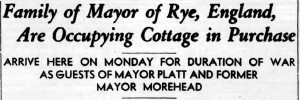
This was the headline that appeared on the front cover of the 1 November 1940 issue of the Rye (New York ) Chronicle. The text was as follows.

This article throws some light on the events surrounding the Rye Mayor’s departure and resignation but it raises more questions than it answers.
It partly explains a letter that Jo Kirkham had seen in the council files from John M. Moorhead, the Mayor of Rye New York, offering a place of safety for the children of Rye Sussex in Rye New York for the duration of the War.
It now seems that offer was only executed in favour of the Mayor’s wife and children. The rest of the children of Rye were evacuated to Bedford.

Mrs. Marsden, wife of the Mayor of Rye, England, who is staying in Purchase for the duration of the War, was introduced to the Forum audience on Sunday night, after the address by the Hon. A Baldwin Raper, former member of the British Parliament.
This one sentance mention of Mary Marsden three months later tells us she was still in Rye New York then but after that there is no trace of her or any of her children.
What was the Big Secret?
It is strange that Rye Borough Council would not divulge the full contents of Mayor Marsden’s letter of his explanation as to where he was going and what he was doing –
“Important duties in a Government department required his absence from the town” – implying that it was secret work! Why then was Mary Marsden quite happy to tell the American press where he was working and what he was doing? The people of Rye New York were not kept in the dark as the people of Rye were.
I understand George Marsden’s motives in getting his family to a place of safety, but as Mayor of Rye, his duties were also to ensure the safety of the rest of the children in Rye at that desperate time.
What happened about the offer from Rye New York to take the others?
I found this report in two New York papers published on 19 July when George Marsden was still officially Mayor of Rye and following events in Rye as they unfolded. He was obviously still in touch with the Mayor of Rye New York.
It seems strange that the only children to take up the kind offer of the people of Rye New York were his own!
The Marden’s four children, David, Christopher, Andrew and Georgianna and his wife Mary were still in Rye New York in March 1941 but I have found no later mentions of Mary or any of the four children there at any time after march 1941 – In fact I can find no other mention of any of them, or George Marsden, in the 74 years that have passed since then.
The Horrowgate mention seems accurate enough as the Ministry of Aircraft Production did have facilities there, but I have been unable to find
any trace of George Marsden, even in the local area. It was wartime and I assumed many records would have been destroyed or mislaid in the bombing or perhaps George had been killed in a raid. This was not the case however, Harrogate had just one bomb dropped on it – a hit on the Majestic Hotel that did little damage.
The mystery remains unsolved.
Post Script.
The only other findings since the article was printed
1. Mary Marsden Died in 1958 – No other details
2. Davis (son) Died in 1969 – No other details
3. Christopher (son) Died 2009 – Quebec Canada.
There are still no traces that we can find of George Marsden since 1940
Postscript
In September 2016 “Rye’s Own” had an email from Andrew Marsden, the last surviving son Of George. This solves the mystery of why George Marsden did not return to Rye after the war and where he did go and where he died.
“Here is some info about the above. GM was my father. He had 4 children of which I was the youngest. He lived before the war at Tower House, West St, Rye and before that at Church House. During the war he evacuated his wife and children to the States while he stayed on in England. He let the Army have his house while he lived in a flat at Vincent House Pembroke Square, Notting Hill Gate, London. He worked as a Principal in Lord Beaverbrook’s Ministry of Aircraft Production but came back to Rye most weekends to play Golf. He used to stay at the Dormy House. At the end of the War he had a heart attack and his wife had TB, so they decided to move to Bush, Spreyton, Crediton, Devon. He lived quietly there until his death in 1965 Before he became Mayor of Rye he was a barrister and then legal adviser to Calouste Gulbenkian (he is mentioned in Nubar’s book Pantaraxia)
Yours, Andrew Marsden
“Rye’s Own” July 2015
All articles, photographs and drawings on this web site are World Copyright Protected. No reproduction for publication without prior arrangement. © World Copyright 2015 Cinque Ports Magazines Rye Ltd., Guinea Hall Lodge Sellindge TN25 6EG
